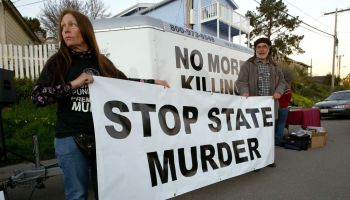“We cannot run society for the privileged and allow a significant proportion of the population to be marginalized. It impacts the quality of life for all of us. If we have throwaway people, a justice system which tolerates injustice is doomed to collapse. I am truly ready for action.”
Rev. Edward Pinkney
They came in my yard.
Baby Suggs. In Toni Morrison’s Beloved, she is the stand-in figure for our living elders and spirited ancestors. In the old days, they had preached, nothing in excess. They wanted what was due: their rights of human beings, citizens of the world. They wanted to right to love their people, Black people. Baby Suggs, too, continued the tradition of preaching in Cincinnati to a community of those once enslaved on the plantation, “nothing in excess.”
In the United States, excess is the name of the game.
But who or what turned the people? How were the “four horsemen” able to come in my yard, Baby Suggs wondered.
There was the feast. After freedom came, there was the feast that put the tables at wealthy plantation mansions to shame. Baby Suggs presided over the feast held at her house. The community came but after a while, they began to whisper. “Too much…where does she get it all?”
“It made them furious…the reckless generosity on display at 124.”
Baby Suggs took in “the smell” of sharp disapproval.
Why didn’t the boy come and warn them?
Then one day she understood; she could see it. And it wasn’t “whitefolks,” not directly-“that much she could tell.”
“So it must be colored ones. And then she knew. Her friends and neighbors were angry at her because she had overstepped…offended them by excess.”
The boy, the neighbor’s son, didn’t come down the road to warn them that the slaveholder and his nephews were coming for her daughter-in-law and grandchildren.
Baby Suggs made a mistake. There were consequences for taking her eye off freedom and the means to accomplishing it. But for this community during slavery there was less entanglement with the America of excess. Her spirit is redeemed in Beloved as she is the ancestor who, in her death, is remembered and called upon to guide individuals (the furious, the resentful, the violent, and the indulgent) toward the unification of a physically and mentally healthier community.
But Morrison is forcing us to recognize the Black community now, in the present. We are to look at what divides our community now, what enters our backyards. What destructive forces we allow in our backyards from outside our convictions to free all our people from poverty, injustice, and inequality.
Today, our Black politicians are unredeemable! They have forgotten the ancestors and have forgotten the collective struggle for freedom. We live in an atmosphere were the politicians, the neighbor’s sons and daughters, are not just standing by watching the “four horsemen” ride into the community; they are waving them in! The “four horsemen” come through the front door, unabated. And the people, the “unworthy,” the already left behind, who suffer this betrayal, aren’t brought to the table. The Black politicians don’t ask the community what it wants. They have a vision of what freedom means to and for them, and it means indulging in the excess of the free market.
Freedom is getting rich, making millions on business deals with corporations in what were once Black urban communities. Indulging in an economic system that thrives on excesses for the middle class and wealthy while dependent on a poor and a low-paying working class is to indulge in the continued oppression of the Black community.
We live in an atmosphere were the “reckless generosity” of Black politicians is on display in many Black communities across this nation, and the community, furious, has nonetheless been scattered to the winds while Black hands shake white hands and sign building expansion contracts (takeover contracts) behind closed doors. We are not talking about “mistakes.” These Black politicians and civic office holders engage in criminal behavior against their communities.
In this atmosphere of “reckless generosity” on the part of Black politicians, civic and religious leaders to corporations for personal gains, the struggle for freedom is a difficult task for a peoples’ leader such as Rev. Edward Pinkney.
Rev. Pinkney has served time for over a year in four prisons in the state of Michigan. He was finally released December 24, 2008. His original crime: He dared to challenge the takeover of the Black community in Benton Harbor, Michigan by Whirlpool, Inc in conjunction with the Harbor Shores Project! He came forth and organized the community to protest a one billion dollar deal to build a Jack Nicholas Signature golf course, a multimillion dollar beachfront resort, condominiums-on the “yards” owned or rented by Black people. We have all heard Black politicians in Berrien County considered this deal, which would buy out Black residents with homes and move others out of the community, a great move forward. Progress!
We have all heard the “budget” narrative. You know the one that says there’s not enough money to rebuild employment opportunities or to build decent housing. The residents of Benton Harbor heard this narrative and lived within an area that continued to be under funded and overlooked after many of the residents lost employment with the auto industry. The “budget” narrative cuts out jobs and decent housing for all while the “urban renewal” narrative (otherwise known as the gentrification narrative) expands job opportunities and housing for the middle class and the wealthy.
“The Edge Water plan, a 442 acres Brownfield development project” begun in 2002, would, according to Mrs. Dorothy Pinkney, April 15, 2009, BANCO.Blogspot.com, connect the “all-white city, St. Joseph,” to the “all-Black Benton Harbor.”
“We call this stealing the land.”
On June 26, 2008, Rev. Pinkney was taken from his prison cell and brought before Judge Dennis Wiley. Prior to this hearing, Rev. Pinkney had committed another, most egregious crime. He wrote a letter to Chief Judge Alfred M. Butzbuagh (a man whose law firm is caught up in the theft of Benton Harbor) in which Rev. Pinkney quoted from Deuteronomy 28:14-22. Judge Butzbaugh would have to answer for his deeds against the Benton Harbor community. Judge Wiley, at the June hearing, informed Rev. Pinkney and the court that the reverend had “threatened” Judge Butzbaugh with this quote! Wiley sentenced Rev. Pinkney to 3-10 years in prison-for quoting the Bible-the first time in history anyone has been sentenced to prison for quoting the Bible!
Since Rev. Pinkney’s release last December, he has continued the fight against a corporate ideology that says greed is good and excess at all cost to human lives.
The Black community across the nation must join Rev. Pinkney in a fight for freedom for all!
Please go to: bh.banco.blogspot.com for more information. You can also call Rev. Pinkney directly at 269 925-0001 or email him at banco9342@sbcglobal.net.
The embattled community remembered that “she [Baby Suggs] told them that the only grace they could have was the grace they could imagine. That if they could not see it, they would not have it.”
















